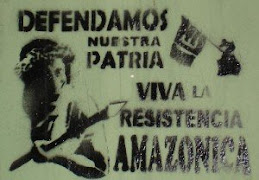Alberto Pizango, president of the Peruvian national indigenous federation AIDESEP, has been arrested immediately upon his return to Lima today (May 26, 2010) after several months in exile in Nicaragua. He is facing politically motivated charges in Peru which Peruvian human rights experts say have no legal foundation and should have been dismissed long ago.
Pizango was granted asylum in Nicaragua nearly a year ago after the Garcia administration attempted to hold him responsible for fatalities during the violent June 5th army raid on indigenous protestors outside the Amazon town of Bagua. The incident, which left 34 people dead on both sides and more than 200 people injured, eventually led to the Peruvian Congress repealing two of nine contested Presidential decrees that had sparked nationwide indigenous protests.
International and Peruvian human rights groups are calling on the Garcia Government to drop the trumped up legal charges against Pizango and instead address the root causes of the conflict with indigenous peoples.
Pizango said of his decision to return "I represent indigenous peoples, I am returning to take on the hard task of resolving these problems, so that we as indigenous peoples can have a voice, can have justice, and can truly live in peace as we deserve."
Pizango returned just days before Peruvian President Alan Garcia is scheduled to meet with U.S. President Barack Obama in Washington, D.C. on June 1st. Lima will also be in the spotlight as it hosts the General Assembly of the Organization of American States from June 6-8.
The protests last year were sparked when President Garcia used the U.S.-Peru Free Trade Agreement to justify the promulgation of a series of decrees that roll back indigenous land rights and open much of the Peruvian Amazon to foreign corporations. Given the U.S. connection to the conflict in Peru, rights groups are pushing President Obama to raise this issue with Garcia.
"Pizango's courageous return to Peru marks an important opportunity for the Peruvian government to begin repairing its relations with indigenous peoples," said actress and indigenous rights activist Q'orianka Kilcher. "President Garcia should consider that the world is watching and that all of this is unfolding on the eve of his meeting with President Obama and the assembly of the Organization of American States."
Peruvian human rights experts agree that the pending charges against Pizango have no legal foundation and should have been dismissed long ago.
Pizango stated: "Nearly a year has passed since the tragic events in Bagua, yet we have not reached any resolution. Now is the moment for the Peruvian government to show good faith and stop persecuting indigenous peoples."
To mark the one-year anniversary of the violence in Bagua, indigenous and human rights groups are planning a series of events to bring attention to continuing indigenous rights violations and the criminalization of protest in Peru.
In February 2010, the International Labor Organization (ILO) of the United Nations asked the Peruvian government to "suspend the exploration and exploitation of natural resources which are affecting [indigenous peoples]" until the government has developed consultation and participation mechanisms in compliance with the ILO convention 169 on the rights of indigenous peoples.
"The Garcia administration does not seem to have learned the harsh lessons of Bagua. Just last week, the government intensified its assault on indigenous rights by offering yet more indigenous territory to foreign oil corporations so that half of all indigenous lands in the Peruvian Amazon now fall within oil concessions," stated Atossa Soltani, Amazon Watch's Executive Director.
"President Garcia is imposing a model of 'development' for the Amazon that is based on shortsighted extraction of natural resources and tramples on the rights of the people's whose lives depend on the rainforest," added Soltani.
International norms such as ILO Convention 169 and the United Nations Declaration on the Rights of Indigenous Peoples obligate governments to respect indigenous peoples' right to decide their own future. Governments are legally required to obtain the free, prior and informed consent of affected indigenous peoples before moving ahead with policies or economic activities.
Republished from Amazon Watch
Wednesday 26 May 2010
Subscribe to:
Posts (Atom)
